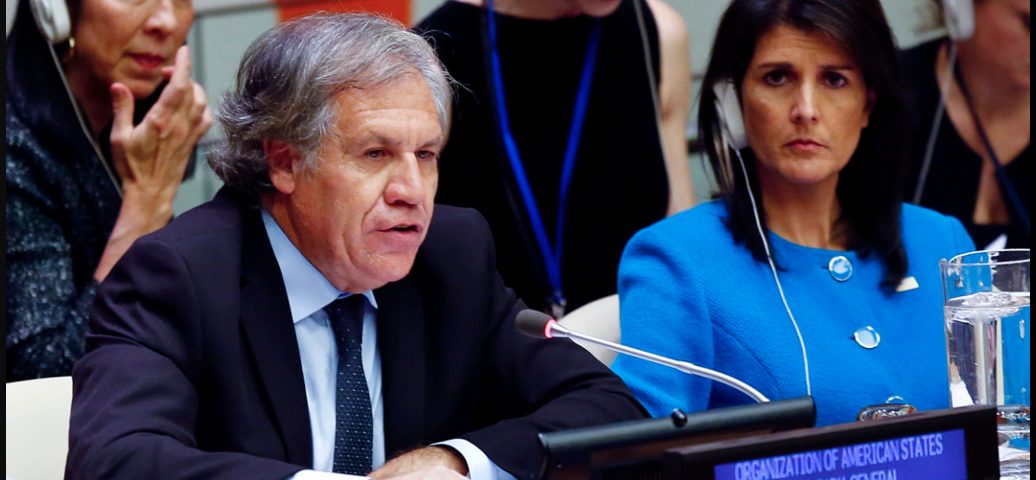United Nations U.S. Ambassador Nikki Haley, right, listens as Organization of American States Secretary General Luis Almargo speaks during a U.N. meeting on human rights concerns in Venezuela, Monday Nov. 13, 2017 at U.N. headquarters. (AP Photo/Bebeto Matthews)
by Dakota Lilly, previously published in Mint Press News
THE HAGUE, NETHERLANDS (Opinion) — The prosecutor of the International Criminal Court, Fatou Bensouda, recently announced that a “preliminary investigation” would be launched into the sovereign state of Venezuela, citing alleged incidents of state violence committed during the months of street protests in 2017. These violent protests claimed the lives of over 100 people from direct violence, violence related to looting, road blockades that prevented ambulances from reaching hospitals, as well as instances of adventurism.
The prosecutor failed to mention where her information was coming from, what brought her attention to this issue, or a justification for the ICC getting involved. Also absent from the press release or any mainstream coverage of Venezuela is the fact that most of the violence committed has been at the hands of the opposition. Some leaders of opposition parties were even seen directing protesters clad in gas masks and with weaponry.
The Rome Statute stipulates that the ICC may get involved if the state in question is “unwilling or unable” to prosecute certain crimes to the detriment of the citizens of the state. This does not apply to Venezuela, nor do claims of “humanitarian crisis,” as will be demonstrated in the following paragraphs.
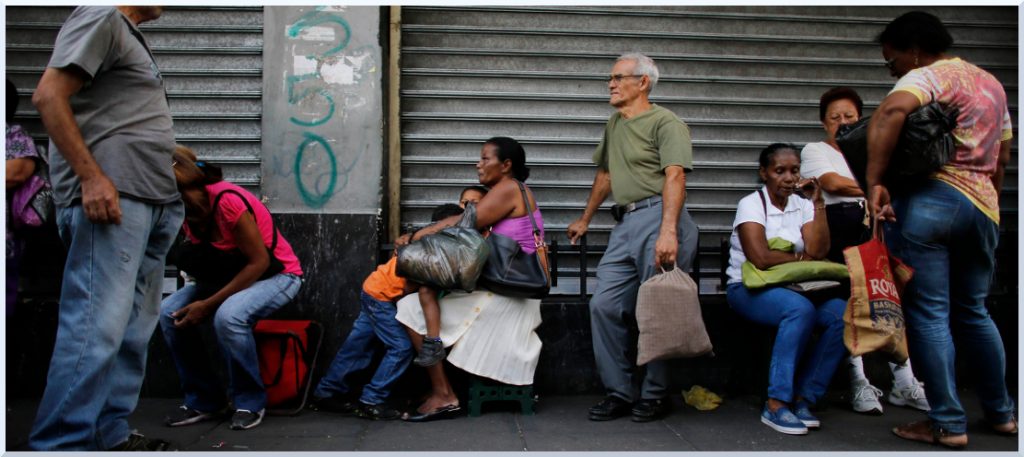
Problems and obstacles, yes; “humanitarian crisis,” no
In September of 2017, many in the media had a field day when Delcy Rodriguez, the president of the newly convened National Constituent Assembly and former foreign minister, stated strongly in an interview with Al Jazeera that “there is no humanitarian crisis in Venezuela.” Contrary to the content of the interview, many talking heads twisted this to mean that Rodriguez was denying that any problems or obstacles occurred in Venezuela. Apart from the material conditions and statistics that disprove a humanitarian crisis (such as Venezuela receiving recognition from the Food and Agriculture Organization wing of the UN in 2015 for its efforts in eliminating hunger, as well as caloric intake being above the FAO’s guidelines for food security), what Rodriguez did is correctly refute the legality of a humanitarian intervention in Venezuela.
We should be wary of hyperbole and exaggeration, bearing in mind that “humanitarian crisis” is a terminus technicus that can be misused as a pretext for military intervention and regime change. In the international arena, “humanitarian” intervention has been invoked against numerous states such as Libya, Kosovo, Iraq, Syria, Afghanistan, and Serbia. In every case, there is the same familiar script: a tyrant or dictator violating the rights of his or her people, who must be stopped at risk of jeopardizing world peace. So not only is it paramount to telling the truth to deny the existence of a humanitarian crisis in Venezuela, but it is also needed in order to protect the sovereignty of Venezuela and the lives of the Venezuelan people.
John Kelly, head of the U.S. military’s Southern Command until 2016, said that if a humanitarian crisis persisted in Venezuela a military option would be explored. This sentiment has been supported by President Donald Trump, who has said that he “would not rule out a military option” in regard to Venezuela. Such usages underwrite the importance of demystifying the loaded term “humanitarian crisis.” Unfortunately, the international legal arena requires this degree of semantic parsing, based on the long history of surmounting legal obstacles to war through terms like “humanitarian” crisis or intervention.
The “legalese” surrounding the preliminary investigation into Venezuela for “alleged state crimes against humanity” is of the utmost importance. The notion of a “preliminary investigation, which the ICC is opening against Venezuela, is nowhere to be found in the Rome Statute. The most applicable document that explains what a preliminary investigation is, is a 2013 policy paper that explains the reason for a preliminary investigation is “determining if there exist reasonable findings to start an investigation,” while clarifying that they themselves are not formal investigations.
Investigating whether to investigate
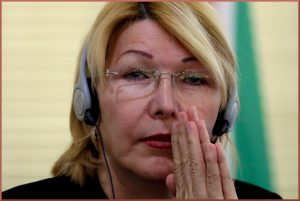
So what exactly is a preliminary investigation? An investigation (but not an investigation) that is launched to determine whether an investigation is needed. Now if that isn’t clear, concise and sensible, then perhaps it’s time to brush up on your Orwell. The ICC prosecutor launched this investigation on her own accord, but why was Venezuela not notified until after the decision had already be made? Why was the government of Venezuela not afforded the right to disprove these allegations or at the very least participate in a dialogue?
I think it is fairly obvious that there are more actors behind this decision than just Fatou Bensouda. My own hypothesis is that Luisa Ortega Diaz, a former attorney general living in exile who has several corruption charges against her, has filled the prosecutors heads with lies. Under Diaz, corruption and various cases of violence went uninvestigated until she eventually fled to Colombia with the former head of Venezuela’s DISIP (a secret police organization from two decades ago notorious for torture, murder and violation of human rights).
Diaz recently went to The Hague and accused the Venezuelan government of crimes against humanity — and, not long after this, the prosecutor announced she was opening up an investigation. There is a clear conflict of interest in regard to Diaz, and there is also no doubt in my mind that Bensouda is under immense pressure from the United States to open this investigation. Would we take what the fox says about the hens as absolute fact and without consulting the hens? I hope not.
The ICC is stipulated by the Rome Statute as a “complementary” court that is able to open legal proceedings only in cases in which national legal institutions fail or are unable to address them. Also worth noting is that, as defined in the November 2013 policy paper previously referenced, preliminary investigations “arise from the principle of complementariness. National
jurisdictions have the primary responsibility of ending impunity for the accused crimes.” This further complicates the ICC’s jurisdiction in Venezuela, considering the actions the Venezuelan state has taken in regards to the violence experienced in 2017.
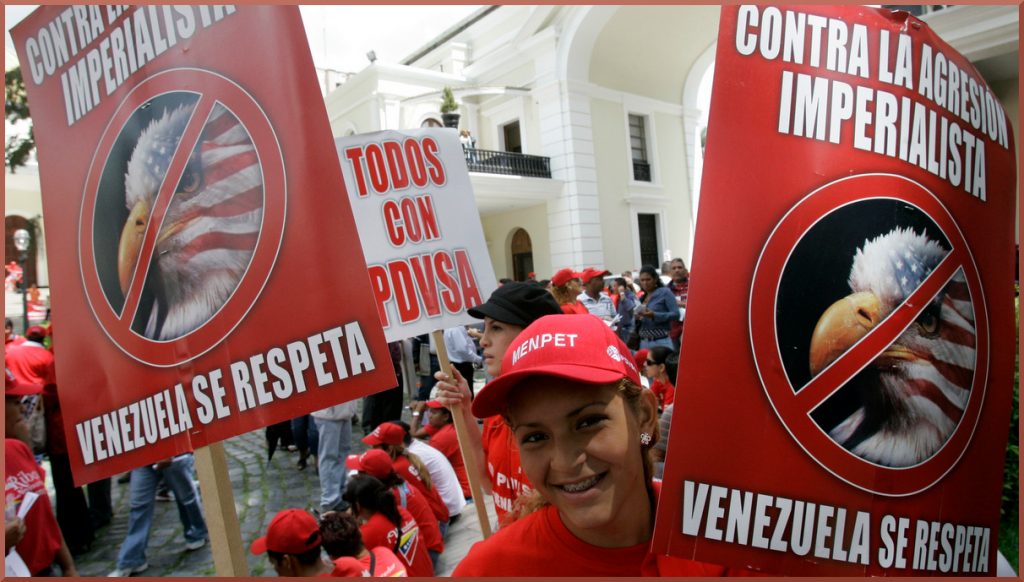
There’s no vacuum, so why is ICC rushing in?
Two of the first acts passed by the Constituent Assembly of Venezuela were the dismissal of the attorney general seen as turning a blind eye to prosecuting the violence, as well as the establishment of a “Truth, Justice, and Reparations Commission for Victims” in relation to the protest violence. The Constituent Assembly has also ended the use of military trials for some of these cases despite a major backlog in civilian courts. The Commission for Victims in tandem with the Constituent Assembly also released 80 people who participated in the riots and protests as a sign of the government’s commitment to further dialogue and reconciliation. In conjunction with all of this, dozens of police officers, national guard members, and members of the military have been arrested for violating the rights of people and are being submitted to justice.
It is therefore abundantly clear that the Venezuelan state is taking numerous and continuous measures in the interest of peace, justice and tranquility. The action by the ICC in its “preliminary investigation” is illegal under the Rome Statute for violating the sovereignty of Venezuela. Furthermore, the exceptions set out in the Statute that permit an investigation to take place are not applicable in Venezuela, where the state is actively working towards justice and peace.
There are some genuine obstacles in the path of the Bolivarian Revolution and the Venezuelan Government. However, the last thing the country needs is even more foreign intervention or colonialist finger-wagging. Alfred De Zaya — a professor at the Geneva School of Diplomacy and International Relations, and the UN Independent Expert on the Promotion of a Democratic and Equitable International Order — recently visited both Ecuador and Venezuela.
In his words, “the situation in Venezuela definitely does not reach the threshold of humanitarian crisis.” Not to say that there are not societal or structural problems that are being addressed, but the hyperbole involved in branding Venezuela a “failed state” is an affront to truth and the people of Venezuela.
It is also of the utmost importance that we understand the lengths to which the economic war is caused and exacerbated by actions of the U.S. government. For instance, the sanctions put on Venezuela caused 300,000 doses of insulin destined for Venezuela to sit in port. The sanctions make it especially difficult to import food and medicine, as payment methods are greatly affected. The president of Colombia also halted a shipment of anti-malaria medicine when it was known that the destination was Venezuela.
This statement from CIA Director Mike Pompeo is also quite telling: he began by saying he is “hopeful that there can be a transition in Venezuela the CIA is doing its best to understand the dynamic there.” He added:
I was just down in Mexico City and in Bogota a week before last talking about this very issue, trying to help them understand the things they might do so that they can get a better outcome for their part of the world and our part of the world.”
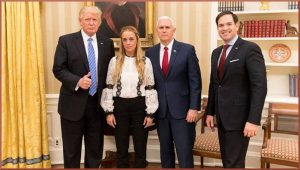
When it comes to outright bribes, the U.S. government is quite generous. According to Telesur (and Vice, and WikiLeaks, et al) the Venezuelan right-wing opposition has received over $49 million from the U.S. government. This is the same opposition that has participated in bombings and other terroristic acts directed at hospitals, the Supreme Court Building, and Bolivarian National Guard members. These videos of such acts are as telling as they are chilling. If such attacks were occurring in the United States, is there any doubt that it would trigger martial law?
What the world can and should do to help
So what is to be done on the international stage? To begin, as De Zaya stated, when speaking of the sanctions applied against Venezuela by the United States, Canada, the OAS, and the European Union:
Direct and indirect sanctions have hit the economic situation in Venezuela seriously. The sanctions must be terminated. The economic war has to end — that would be the greatest help for the country. However, what we can observe in Venezuela is the result of a targeted economic war. There are many countries participating, even from Europe.”
On top of this, the idea of an oil embargo has been floated by Argentine President Mauricio Macri as well as by President Trump. As oil represents upwards of 90 percent of government export revenue — which is then used to import food, medicines, hygiene products, etc., — this will only exacerbate the problems already caused by the U.S.-led economic war. The fact that this idea is being floated is further proof that the concern of international actors is not with the people of Venezuela but instead focused on invalidating and attacking the sovereign government of Venezuela.
There are actions the international community might take if its concern actually lay with the people of Venezuela. Ending the sanctions, fighting smuggling and hoarding of subsidized goods, and prosecuting companies and actors engaging in the economic war are just some of the things that can be done. Starting bogus and politically charged “preliminary investigations” against the democratically elected, popular, and inclusive government of Nicolas Maduro is not one of them. Eighty percent of eligible voters voted in the last presidential election in 2013, which saw Maduro elected, albeit narrowly.
Perhaps the ICC could be directed to the crimes being committed in Palestine, Colombia, Saudi Arabia, or Ferguson — oppression funded and sponsored by the United States — if they are experiencing a slow day at The Hague.
Top Photo | United Nations U.S. Ambassador Nikki Haley, right, listens as Organization of American States Secretary General Luis Almargo speaks during a U.N. meeting on human rights in Venezuela, Nov. 13, 2017 at U.N. headquarters. (AP/Bebeto Matthews)
Dakotah Lilly is a political activist and the co-founder of Students and youth For a New America.
